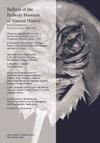The Chelicerae of Slimonia (Eurypterida; Pterygotoidea)
IF 0.9
4区 哲学
Q2 BIODIVERSITY CONSERVATION
引用次数: 3
Abstract
Abstract Pterygotid eurypterids are the most speciose eurypterid clade, accounting for almost a fifth of the approximately 250 known species, although it is unclear whether this increase in diversity is due to their increased dispersal ability, shift in predation style to cheliceral-driven prey capture, or some other factor. Determining if the development of their characteristic large chelicerae represents a key trait facilitating increased diversification is hindered by uncertainty regarding the form of the chelicerae in Slimonia, the sister taxon to Pterygotidae. Here I report the discovery of a specimen of Slimonia acuminata preserving the chelicerae in detail and corroborate reports from the 1800s suggesting that the chelicerae of Slimonia were short and robust. The evidence from the new specimen, taken in concert with the morphology of the rest of the animal, indicates that Slimonia was an active predator that captured prey with its robust prosomal appendages. The apparent increase in pterygotid species diversity therefore does indeed seem to be associated with the development of the large chelicerae; however, further work is needed to determine whether taphonomic biases in preservation due to increased sclerotization of the chelicerae or taxonomic oversplitting due to minor changes in denticle morphology are driving this phenomenon.Slimonia的Chelicerae(Eurypterida;Pterygotoidea)
摘要翼龙是种类最多的翼龙分支,在大约250个已知物种中几乎占五分之一,尽管尚不清楚这种多样性的增加是由于它们的扩散能力增强、捕食方式向螯肢驱动的猎物捕获的转变,还是其他因素。确定它们特有的大型螯肢科的发育是否代表了促进多样化的一个关键特征,受到了关于鞘翅目螯肢科形式的不确定性的阻碍,鞘翅目是翅科的姐妹分类单元。在这里,我详细报道了发现的一个保存着龟甲科的尖唇菌标本,并证实了19世纪的报道,即尖唇菌的龟甲科又短又结实。新标本的证据与该动物其他部分的形态一致,表明Slimonia是一种活跃的捕食者,用其强健的前体附属物捕获猎物。因此,翼翅目物种多样性的明显增加似乎确实与大型螯肢科的发展有关;然而,还需要进一步的工作来确定是否是由于螯蟹科的硬化增加而导致的保存中的地形学偏差或是由于小齿形态的微小变化而导致的分类学过度扩张导致了这一现象。
本文章由计算机程序翻译,如有差异,请以英文原文为准。
求助全文
约1分钟内获得全文
求助全文
来源期刊

Bulletin of the Peabody Museum of Natural History
BIODIVERSITY CONSERVATION-ECOLOGY
CiteScore
2.40
自引率
0.00%
发文量
6
审稿时长
>12 weeks
期刊介绍:
The Bulletin of the Peabody Museum of Natural History publishes original research based on specimens, artifacts and related materials maintained in the collections of the Yale Peabody Museum of Natural History’s curatorial divisions. The Bulletin is published twice a year, in April and October.
 求助内容:
求助内容: 应助结果提醒方式:
应助结果提醒方式:


